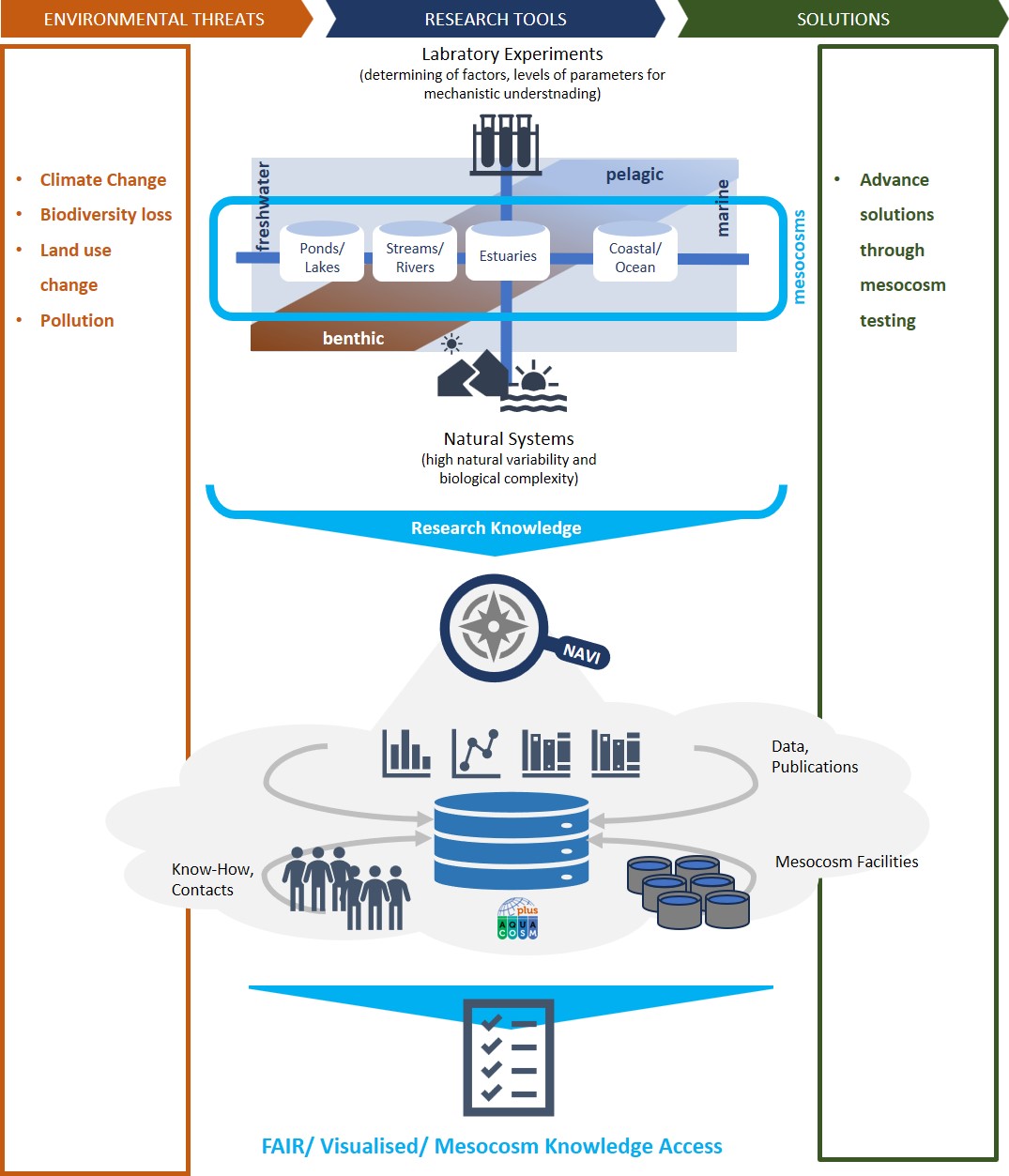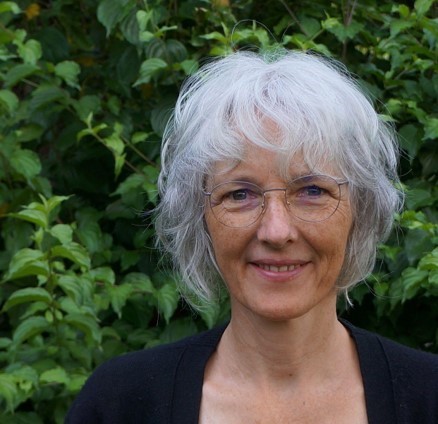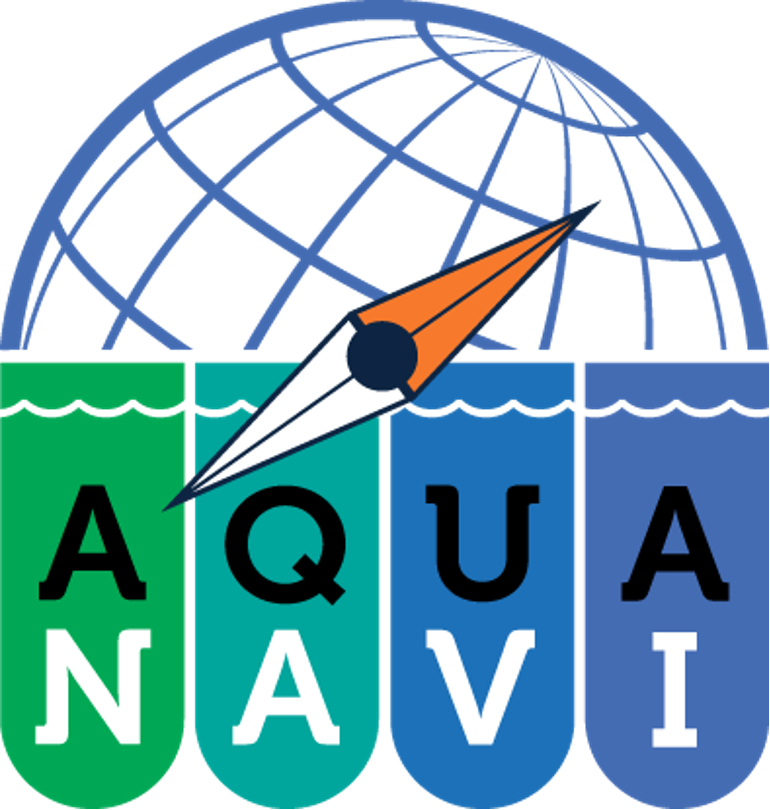Science clusters

Summary
Critical environmental challenges affect aquatic ecosystems worldwide, and the need to coordinate research efforts is increasingly urgent. Mesocosms are key Research Infrastructures (RIs) allowing the study of highly complex environments comparable to natural ecosystems. Mesocosm experiments, which offer controlled yet realistic settings, are crucial for understanding and mitigating the impact of various stressors and their combinations on aquatic ecosystems. The AQUACOSM-RI consortium, comprising over 60 individual state-of-the-art mesocosm facilities at 28 host institutions across Europe, has therefore been instrumental in advancing aquatic environmental research across climate zones including marine, brackish and freshwater ecosystems.
The AQUANAVI project (Navigating Grand Challenges and their Mitigation using Aquatic Experimental RIs) aims to create an interactive atlas of aquatic mesocosm-based experimental research. Data, publications, reports and information generated by the AQUACOSM consortium and other mesocosm facilities worldwide will be integrated into a single, accessible platform incorporating Open Knowledge Maps' AI-driven visual discovery tools. The project will foster collaborations and, by enhancing data FAIRness, it will facilitate fast discovery and efficient use of aquatic RIs globally, accelerating the development of environmental mitigation strategies.

Challenge
Open Science project, Open Science Service, Cross-domain/Cross-RI
Aquatic ecosystems are under pressure from a variety of stressors, including pollution, habitat degradation, rising temperatures, and ocean acidification. These challenges interact in complex ways, making it difficult to predict their combined effects and develop mitigation measures. Experimental mesocosms, which offer controlled but realistic environments, are critical for studying the impact of these stressors. However, despite their significance, the extensive yet fragmented resources available in mesocosm-based research remain difficult to access and leverage.
Solution
AQUANAVI addresses this by creating an interactive atlas that integrates data, publications, reports and facility information from the AQUACOSM consortium and other mesocosm RIs worldwide. This platform enables quick discovery of available resources, facilitating new collaborations and expediting experimental setups. Using the Hi Knowledge platform, AQUANAVI merges advanced semantic capabilities (e.g., Wikidata), AI technology (e.g., Open Knowledge Maps), and visualisation tools (e.g., Open Knowledge Maps and Scholia) to help researchers navigate complex information with ease, using cutting-edge visualisation techniques, artificial intelligence, and knowledge synthesis methods, and bridging gaps between disconnected research facilities and data sources.
Scientific Impact
Open and collaborative by design, AQUANAVI’s architecture will engage a broad range of research communities. By consolidating data and information from diverse RIs, the platform will leverage and enhance the AQUACOSM and related RIs, securing the reusability and interoperability of existing data collections and better exploration of existing RIs in the future.
Compliant with FAIR principles and EOSC requirements, AQUANAVI will ensure the long-term sustainability and openness of its resources, enriching both the ENVRI services portfolio and the broader scientific community. In summary, AQUANAVI will empower researchers and stakeholders to implement measures to mitigate the effects of climate change and other Grand Challenges facing aquatic environments, serving as a key resource within and beyond the European Research Area.
Results
- SPARQL endpoint: the initial queries to uncover metadata in our corpus were produced
- OAI-PMH endpoint: an initial OAI-PMH endpoint was set up, and the functioning of the data pipeline through the data aggregation and visualisation services used in the project has been proven.
- Data modelling started: created a first version of a table with metadata properties on the aquatic mesocosm facilities, experiments conducted and related publications to be represented on the AQUANAVI platform.
- Sample data evaluation: Open Knowledge Maps first conducted a thorough evaluation of the sample data provided by mesocosm.org.
- Main usage scenario and user needs defined for geomap prototype: In order to identify the most important data needed for the tools Open Knowledge Maps wants to build, user needs were analysed, and the project team agreed on the main issues to be solved in this project. A main usage scenario was defined to guide important decisions around metadata and main functionalities.
- Open Knowledge Maps metadata requirements: Based on the main usage scenario and the sample data evaluation, Open Knowledge Maps put together metadata requirements. These are important guidelines for the OAI-PMH endpoint developed in “Task 3 - Semantic data environment”. The document also includes two tables, one for the mapping of document data and one for mapping mesocosm facility data.
- Designs for geomap’s main functionalities: Based on the main usage scenario Open Knowledge Maps created a first draft of the designs of the visualisations main functionalities.
- Evaluation of geo map libraries: Open source geomap libraries were evaluated by Open Knowledge Maps according to their ability to fulfil user needs, UX and technical requirements. A library has been selected.
- Necessary updates to Open Knowledge Maps technical platform: Open Knowledge Maps has implemented necessary technical upgrades to their platform: a PHP upgrade, as well as significant improvements to application loading times.
- Grant proposal open access in the journal RIO - DOI
- Necessary updates to Open Knowledge Maps technical platform: Open Knowledge Maps has implemented a react upgrade to enable the integration of a new library for the geo map visualisation.
- Implementation of mesocosm data integration: Open Knowledge Maps implemented a dedicated endpoint for the data from mesocosm.org in their open source visualisation software Headstart. Research into how to represent the mesocosm data in the BASE schema was carried out and the results were added to the metadata recommendations. A mapping and enrichment function was created as well as a Mock API, that returns enriched mesocosm data in the BASE schema.
- First prototype of Geo Map frontend integration: Open Knowledge Maps has developed the first prototype of a geographical discovery tool for mesocoms. For this, they integrated the Leaflet library in their open source visualisation software Headstart. After the library was integrated successfully, the new visualisation type was connected to the mesocosm data. Representing the mesocosm data on the map, handling important edge cases and developing interactions on the map according to design specifications was completed. And finally interactions between the geo map and other UI components (e.g. list, search field & filters etc.) were implemented.
Publications
- “Project collection” in the open access journal RIO, including research Ideas and outcomes where documentation will be added over the project’s course | DOI
Events
- 17-19 February, 2025 | Vienna, Austria - AQUANAVI Project Kick-Off Meeting
- 26-31 March, 2025 | Charlotte, North Carolina, USA - ASLO 2025 Aquatic Sciences Meeting
- 15-16 October, 2025 | Stechlin, Germany - AQUANAVI Project Meeting
- 17-19 October, 2025 | Stechlin, Germany - WIKI workshop
- 27 January 2026 | Online - Community Engagement Workshop. Meeting with researchers engaged with mesocosm facilities. Goals: Introduction to AQUANAVI; motivation for updating facility information; discussing collaborative ways to publish knowledge about AQUACOSM and other mesocosm facilities and activities; joint work on harmonising terminology.
Other promotional material
- POSTER | Open Scholarly Metadata for Sharing the Nuances of Research Processes. Workshop on Open Citations 2025 (WOOC 2035), Bologna. Zenodo.
Principal investigator

Tina Heger (Dr.) is an ecologist by training, with a focus on conceptual theory, invasive species, novel ecosystems and ecological novelty. She is engaged in cross-disciplinary research including data scientists and philosophers with the aim to enhance knowledge synthesis and knowledge representation in ecology. She joined the Leibniz Institute of Freshwater Ecology and Inland Fisheries (IGB) in Berlin, Germany, as a PI in 2021. Currently, she is leading a research group at the Center for Interdisciplinary Studies (ZiF) in Bielefeld, Germany, on “Mapping Evidence to Theory in Ecology”.
- AQUANAVI Infographics
- Project web page on IGB website
- AQUANAVI Newsletter


